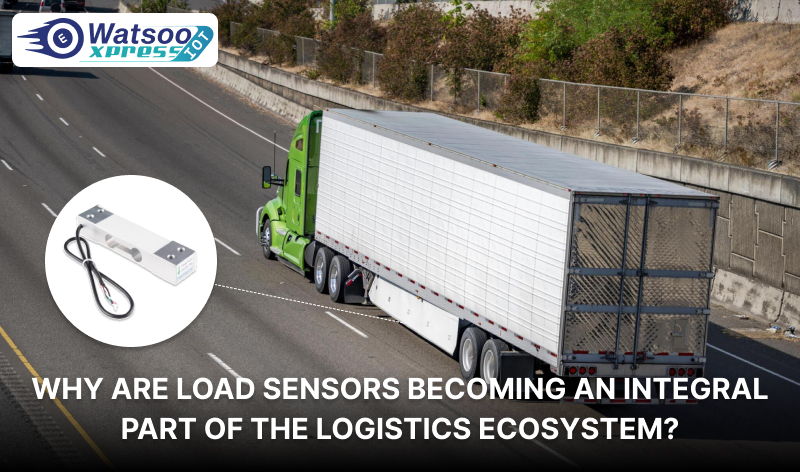Do you know that 50% of all trucks in India risk travelling with excess cargo? Endangering both the driver and the vehicle’s health. In some cases, drivers and businesses pay hefty fines for exceeding weight limits. The problem of overloading attributes is due to various factors. It includes pressure from transport companies to maximise profits, a lack of awareness, and inadequate equipment. Thus, to combat this issue, companies have introduced load sensors. And since then, it has become a crucial aspect for the logistics industry.
So, before moving further in the blog, let’s explore the question: What exactly are these sensors?
What are Load Sensors?
A Load Sensor is a device used to measure the weight or force acting on an object. In the logistics industry, it plays a crucial role in ensuring accurate cargo weight monitoring and compliance with weight regulations. Additionally, it assists in equal load distribution in the cargo.
The sensors work by converting the force or weight applied to them into an electrical signal. You can trace several types of load sensors in the market. Each has its own principles of operation and applications. Some common examples include:
Strain Gauge Load Sensors
These sensors use a metallic foil pattern that deforms under load. Further, it causes a change in electrical resistance. Strain gauge load sensors are widely used in logistics for weighing cargo and it monitors load distribution on trucks and trailers.
Hydraulic Load Sensors
Hydraulic load sensors are a specialized type of load sensing device that are particularly well-suited for measuring and monitoring large and heavy cargo loads. Such types are found in cargo ships or rail transportation.
Piezoelectric Load Sensors
These sensors rely on the piezoelectric effect. Here, the materials generate an electrical charge when subjected to mechanical stress or force. Thus, it is known for its high sensitivity. Which are useful in dynamic load measurement applications.
Air Suspension Load Sensors
Such load cell sensors are commonly used in commercial trucks and trailers. It monitors load distribution and prevents overloading. Air suspension load sensors measure the pressure in the air suspension system of a vehicle.
These are the various types of sensors for monitoring loads, and Watsoo is your ultimate stop to find your preferred sensor. Manage your weight and avoid fines and extra maintenance costs with us. Now let’s check how the system is used in the logistics industry.
What is the use of Load Sensors in the Logistics Industry?
In the logistics industry, load sensors are used in various applications, including:
Cargo Weighing
When cargo is set for transportation, load sensors are used for measuring the weight. It is crucial for maintaining compliance with weight regulations. Additionally, by preventing overloading, you can escape fines, elevate safety, and decrease fuel consumption.
Load Distribution Monitoring
It is necessary to monitor the equal weight distribution in a cargo as it ensures safe driving practices. So, to maintain that, you can strategically place sensors at different points on a trailer. As, it provides stability, prevents wear and tear, and improves fuel efficiency.
Automated Weighing Systems
You can find load cell sensor integrated into automated weighing systems in warehouses. The system can quickly weigh cargo containers. Therefore, it becomes an efficient factor in inventory management in shipping processes.
Overload Protection
The sensors can be used in conjunction with on-board vehicle systems to provide overload protection. If the cargo weight exceeds the vehicle’s rated capacity, the system can alert the driver and can prevent the vehicle from moving until the load is adjusted.
Thus, it is clear that load cell sensor are important for ensuring the security of cargo transportation. It facilitates regulatory compliance, fuel efficiency, and accident avoidance for logistics firms. Furthermore, it guards against harm brought on by overloading or inefficient load distribution.
How Load Sensors Transform Logistics and Transportation?
From the above-mentioned points, it is evident that load cell sensor are an important component for the logistics industry. Here are some examples of how they brought about change in the workings of the logistics industry:
Improved Compliance with Weight Regulations
The sensors enable logistics companies to accurately measure and monitor the weight of their cargo. Therefore, it ensures compliance with local and international weight regulations.
According to a study, overweight violations accounted for many citations in India in 2020.
By using load cell sensor, companies can avoid the fines and penalties associated with overweight violations.
Increased Fuel Efficiency
Overloading vehicles leads to higher fuel consumption and increased emissions.
A study found that a 10% reduction in tractor-trailer weight can result in a 5.5% improvement in fuel economy.
Load Sensors help logistics companies optimise cargo weight, which leads to improved fuel efficiency.
Reduced Maintenance Costs
Overloaded vehicles experience higher wear and tear on vehicle components, such as tyres, engines, suspension and braking system.
A report revealed that proper load distribution can extend tyre life by up to 24%.
Thus, by monitoring load distribution with sensors, logistics companies can extend the lifespan of their fleet.
Enhanced Safety
Overloaded or improperly loaded vehicles are more prone to accidents, rollovers, and handling issues.
According to a survey, overloaded trucks are involved in approximately 18% of all truck crashes.
Load sensors provide real-time data on cargo weight and distribution, which allows drivers to adjust their driving behaviour.
Better Inventory Management
Load sensors in warehouses and distribution centres facilitate the accurate weighing of cargo, improving inventory tracking.
According to a study, Load Sensor Technology in warehouses can reduce inventory inaccuracies by up to 30%.
These examples demonstrate how sensors have revolutionised the fleet and logistics industries. As the industry continues to evolve, the role of sensors is expected to become even more critical in achieving greater efficiency and sustainability.
Conclusion
In essence, we can say that load sensors have transformed the logistics industry, driving efficiency and compliance. By measuring cargo weight and distribution, these sensors enable companies to avoid costly overloading violations. Additionally, it also helps optimise fuel consumption. With real-time data, logistics firms can extend fleet lifespans. Moreover, the sensors enhance safety by preventing accidents caused by improper loading. Thus, it has become an important component for logistics and transportation.
Citing its importance, there are various companies that are coming up with different types of load sensors. Industries can choose as per their needs and demands and make your working space safe. If you are in search of sustainable and pocket-friendly load cell sensor for your company, do not forget to check out Watsoo’s sensors.


